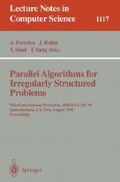Abstract
Recent research has shown that dynamic reconfiguration of resources allocated to parallel applications can improve both system utilization and application throughput. Distributed Resource Management System (DRMS) is a parallel programming environment that supports development and execution of reconfigurable applications on a dynamically varying set of resources. This paper describes DRMS support for developing reconfigurable irregular applications, using a sparse Cholesky factorization as a model application. We present performance levels achieved by DRMS redistribution primitives, which show that the cost of dynamic data redistribution between different processor configurations for irregular data are comparable to those for regular data.
Preview
Unable to display preview. Download preview PDF.
References
Agerwala, T., Martin, J. L., Mirza, J. H., Sadler, D. C., Dias, D. M., and Snir, M., SP2 system architecture. IBM Systems Journal, 34(2): 152–184, 1995.
Chapman, B., Mehrotra, P., and Zima, H. User defined mappings in Vienna Fortran. SIG-PLAN Notices, 28(1), 1993.
Duff, I. S., Grimes, R. G., and Lewis, J. G., Sparse matrix test problems. ACM Transactions on Mathematical Software, 15:1–14, 1989.
Edjlali, E., Agrawal, G., Sussman, A., and Saltz, J. Data parallel programming in an adaptive environment. In Proceedings of 9th International Parallel Processing Symposium, Santa Barbara, CA, April 1995.
Fox, G., Hiranandani, S., Kennedy,K., Koelbel, C., Kremer, U., Tseng, C., and Wu, M. Fortran D language specification. Technical Report COMP TR90-141, Department of Computer Science, Rice University, December 1990.
Indiana University. Sage++, A Class library for Building Fortran 90 and C++ Restructuring Tools, May 1995.
Koelbel, C. H., Loveman, D. B., Schreiber, R. S., Steele Jr., G. L., and Zosel, M. E. The High Performance Fortran Handbook. The MIT Press, 1994.
Kohn, S. R., and Baden, S. B. A robust parallel programming model for dynamic non-uniform scientific computations. In Proceedings of Scalable High-Performance Computing Conference, pages 509–517, Knoxville, TN, May 1994.
Konuru, R., Casas, J., Otto, S. W., Prouty, R., and Walpole, J. A user-level process package for PVM. In Proceedings of the Scalable High Performance Computing Conference, pages 48–55, Knoxville, TN, May 1994.
Konuru, R. B., Moreira, J. E., and Naik, V. K. Application-assisted dynamic scheduling on large-scale multi-computer systems. Technical Report RC 20390, IBM Research Division, February 1996. To appear in Euro-Par'96, Lyon, France, August 27–29, 1996.
Lain, A. and Banerjee, P. Exploiting spatial regularity in irregular iterative applications. In Proceedings of the 9th International Parallel Processing Symposium, pages 820–827, Santa Barbara, CA, April 1995.
McCann, C., Vaswami, R., and Zahorjan, J. A dynamic processor allocation policy for multiprogrammed shared-memory multiprocessors. ACM Transactions on Computer Systems, 11(2):146–178, May 1993.
Müller, A. and Rühl, R. Extending High Performance Fortran for the support of unstructured computations. In Proceedings of the 1995 International Conference on Supercomputing, pages 127–136, July 3–7 1995.
Naik, V. K., Setia, S. K., and Squillante, M. S. Processor allocation in multiprogrammed, distributed-memory parallel computer systems. Technical Report RC 20239, IBM Research Division, October 1995. Submitted to Journal of Parallel and Distributed Computing.
Ramaswamy, S. and Banerjee, P. Processor allocation and scheduling of macro dataflow graphs on distributed memory multicomputers by the PARADIGM compiler. In Proceedings of the International Conference on Parallel Processing, pages II:134–138, August 1993.
Sadayappan, P. and Visvanathan, V. Distributed sparse factorization of circuit matrices via recursive e-tree partitioning. In SIAM Symposium on Sparse Matrices, Gleneden Beach, OR, 1989.
Sharma, S. D., Ponnusamy, R., Moon, B., Hwang, Y., Das, R., and Saltz, J. Run-time and compile-time support for adaptive irregular problems. In Proceedings of Supercomputing'94, pages 97–106, November 1994.
Author information
Authors and Affiliations
Editor information
Rights and permissions
Copyright information
© 1996 Springer-Verlag Berlin Heidelberg
About this paper
Cite this paper
Moreira, J.E., Eswar, K., Konuru, R.B., Naik, V.K. (1996). Supporting dynamic data and processor repartitioning for irregular applications. In: Ferreira, A., Rolim, J., Saad, Y., Yang, T. (eds) Parallel Algorithms for Irregularly Structured Problems. IRREGULAR 1996. Lecture Notes in Computer Science, vol 1117. Springer, Berlin, Heidelberg. https://doi.org/10.1007/BFb0030114
Download citation
DOI: https://doi.org/10.1007/BFb0030114
Published:
Publisher Name: Springer, Berlin, Heidelberg
Print ISBN: 978-3-540-61549-1
Online ISBN: 978-3-540-68808-2
eBook Packages: Springer Book Archive

